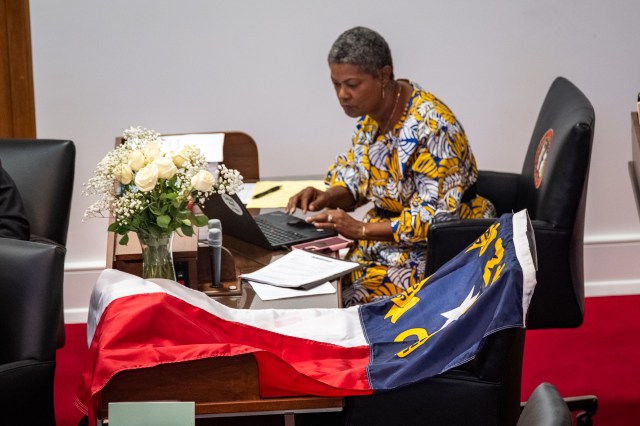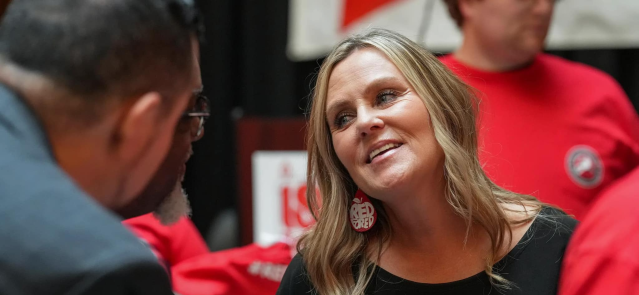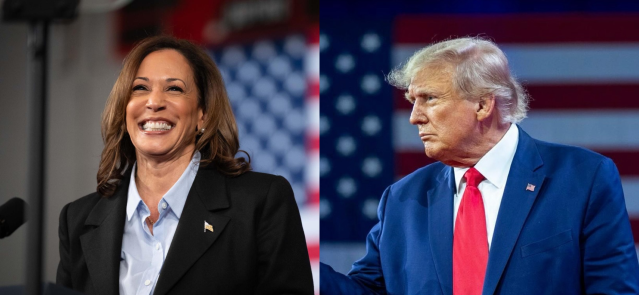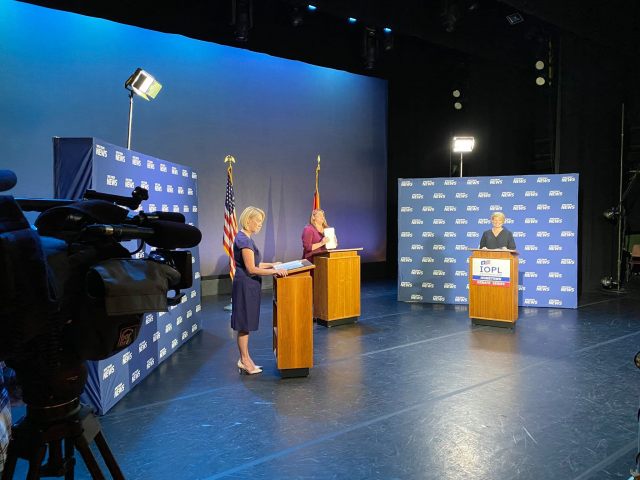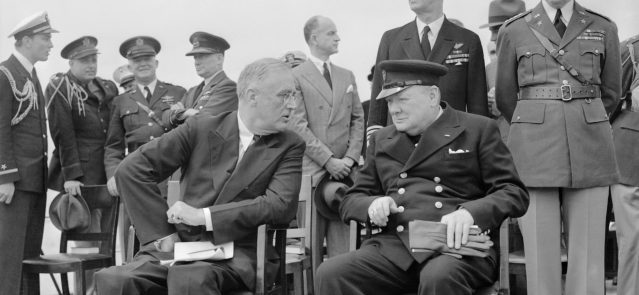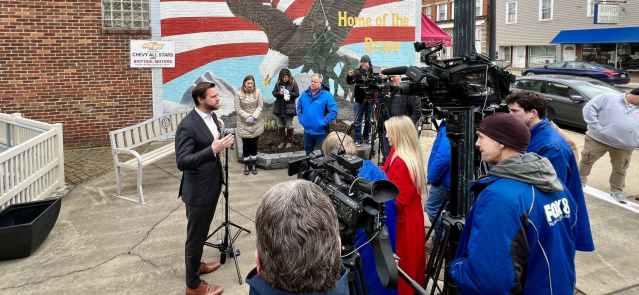After they sparred over abortion, Ukraine and whether Ohio immigrants were eating pet cats and dogs, Democrat Kamala Harris and Republican Donald Trump presented their visions for America’s future.
“You’ve heard tonight two very different visions for our country,” Vice President Harris said. “One that is focused on the future and the other that is focused on the past and an attempt to take us backward. But we’re not going back. And I do believe that the American people know we all have so much more in common than what separates us and we can chart a new way forward. And a vision of that includes having a plan, understanding the aspirations, the dreams, the hopes, the ambition of the American people, which is why I intend to create an opportunity economy, investing in small businesses, in new families.”
Trump offered this: “We can’t sacrifice our country for the sake of bad vision. But I just ask one simple question: Why didn’t she do it?” he said of securing the southern border and creating jobs, this most salient of policy points that the former president waited more than 90 minutes to broach.
“We’re a failing nation. We’re a nation that’s in serious decline,” Trump continued. “We’re being laughed at all over the world. All over the world, they laugh — I know the leaders very well. They’re coming to see me. They don’t understand what happened to us as a nation. We’re not a leader. What these people have done to our country, and maybe toughest of all, is allowing millions of people to come into our country, many of them are criminals, and they’re destroying our country. The worst president, the worst vice president in the history of our country.”
President Bill Clinton used to advise, “Win the future, win the election.”
What millions of Americans witnessed Tuesday night was the 21st century version of Ronald Reagan’s “Morning in America” and a reprise of Donald Trump’s “American Carnage.”
What Americans saw and heard on the second most consequential presidential debate in history (the first, on June 27, forced President Joe Biden out of the race) was the further ascension of Vice President Harris, who has had the best presidential rollout ever over the past eight weeks. She entered the debate with Trump essentially in a toss-up race. Whether that dynamic changes in the coming days will be revealed by the next spate of polling.
Trump, according to CNN’s Chris Wallace, “looked old” as he scowled at the moderators. He hunched over the podium, squinting and scowling. Harris delivered her points to the people by looking directly into the camera. Her body language and her hand and facial gestures showed how incredulous she was at Trump’s responses.
And she baited Trump with remarks about his rally crowd sizes and how boring they are.
After Harris barbed Trump about crowd sizes, he took the bait: “First, let me respond as to the rallies. She said people start leaving. People don’t go to her rallies. There’s no reason to go. And the people that do go, she’s bussing them in and paying them to be there.”
Trump then said that if Harris were to be elected, “You’re gonna end up in World War III.”
Then he shifted to the dogs and cats in Springfield, Ohio.
“What they have done to our country by allowing these millions and millions of people to come into our country,” Trump began. “And look at what’s happening to the towns all over the United States. And a lot of towns don’t want to talk — not going to be Aurora or Springfield. A lot of towns don’t want to talk about it because they’re so embarrassed by it. In Springfield, they’re eating the dogs. The people [immigrants] that came in, they’re eating the cats. They’re eating, they’re eating the pets of the people that live there. And this is what’s happening in our country.”
When moderator David Muir said there was no confirmation of this story from the Springfield city manager, Trump said, “Well, I’ve seen people on television.”
Harris responded, “Talk about extreme. This is, I think, one of the reasons why in this election I actually have the endorsement of 200 Republicans who have formerly worked with President Bush, Mitt Romney and John McCain, including the endorsement of former Vice President Dick Cheney and Congress member Liz Cheney.
“And if you want to really know the inside track on who the former president is, if he didn’t make it clear already, just ask people who have worked with him,” Harris continued. “His former chief of staff, a four-star general, has said he has contempt for the Constitution of the United States. His former national security adviser has said he is dangerous and unfit. His former secretary of defense has said the nation, the republic, would never survive another Trump term.”
On abortion, Trump said this: “Her vice presidential pick [Tim Walz] says abortion in the ninth month is absolutely fine. He also says execution after birth — it’s execution, no longer abortion, because the baby is born — is OK. And that’s not OK with me. Hence the vote. But what I did is something for 52 years they’ve been trying to get Roe v. Wade into the states.”
Harris responded, “Well, as I said, you’re going to hear a bunch of lies. Let’s understand how we got here. Donald Trump hand-selected three members of the United States Supreme Court with the intention that they would undo the protections of Roe v. Wade. And they did exactly as he intended. And now in over 20 states there are Trump abortion bans which make it criminal for a doctor or nurse to provide health care. In one state it provides prison for life.
“Trump abortion bans that make no exception even for rape and incest,” Harris continued, “which, understand what that means: A survivor of a crime, a violation to their body, does not have the right to make a decision about what happens to their body next. That is immoral. Donald Trump, certainly should not be telling a woman what to do with her body.”
There were other revealing moments. When Muir and co-moderator Linsey Davis pressed Harris on the “disastrous” withdrawal from Afghanistan, she hammered Trump’s original deal with the Taliban, saying he even invited the terrorist group to Camp David.
On immigration, Harris said Trump killed a bill last winter negotiated by some of the most conservative members of Congress.
“That bill would have put more resources to allow us to prosecute transnational criminal organizations for trafficking in guns, drugs and human beings,” Harris said. “But you know what happened to that bill? Donald Trump got on the phone, called up some folks in Congress and said kill the bill. And you know why? Because he preferred to run on a problem instead of fixing a problem.”
Trump responded by going off on his Springfield dog and cat sequence.
On Ukraine, the moderators tried to pin Trump down on whether he wants that country to win the war against Russia.
Trump responded, “I think it’s in the U.S. best interest to get this war finished and just get it done. All right. Negotiate a deal. Because we have to stop all of these human lives from being destroyed.”
Harris observed, “It has been about standing as America always should, as a leader upholding international rules and norms. As a leader who shows strength, understanding that the alliances we have around the world are dependent on our ability to look out for our friends and not favor our enemies because you adore strongmen instead of caring about democracy. And that is very much what is at stake here. The president of the United States is commander-in-chief. And the American people have a right to rely on a president who understands the significance of America’s role and responsibility in terms of ensuring that there is stability and ensuring we stand up for our principles and not sell them for the benefit of personal flattery.”
Regarding the Jan. 6, 2021, insurrection at the U.S. Capitol, Harris said, “I was at the Capitol on Jan. 6. I was there. And on that day, the president of the United States incited a violent mob to attack our nation’s capitol, to desecrate our nation’s capitol. On that day, 140 law enforcement officers were injured. And some died. And understand, the former president has been indicted and impeached for exactly that reason.”
Trump responded, “You just said a thing that isn’t covered. ‘Peacefully and patriotically,’ I said during my speech, not later on. ‘Peacefully and patriotically.’ And nobody on the other side was killed.”
When Muir asked Trump, “You were the president. You were watching it unfold on television. It’s a very simple question as we move forward toward another election. Is there anything you regret about what you did on that day?”
Trump responded, “I had nothing to do with that other than they asked me to make a speech. I showed up for a speech. It would have never happened if Nancy Pelosi and the mayor of Washington did their jobs. I wasn’t responsible for security. Nancy Pelosi was responsible. She didn’t do her job.”
Harris made one final point to viewers: “We’re not going back. It’s time to turn the page. And if that was a bridge too far for you, well, there is a place in our campaign for you to stand for country, to stand for our democracy, to stand for rule of law and to end the chaos.”
Asked whether he admitted he lost the 2020 election, saying recently he did so “by a whisker,” Trump responded, “I said that sarcastically. You know that. It was said, ‘Oh, we lost by a whisker.’ That was said sarcastically. Look, there’s so much proof. All you have to do is look at it. And they should have sent it back to the legislatures for approval. I got almost 75 million votes, the most votes any sitting president has ever gotten.”
Harris responded by saying more than 81 million Americans voted to “fire” President Trump.
“She passed the commander-in-chief test,” Democratic consultant Jim Messina, who ran President Barack Obama’s reelection campaign, said on MSNBC’s “Morning Joe” on Wednesday. “You know when you’re in trouble you put your candidate into the spin room.”
About 30 minutes after the debate concluded, Trump appeared in the media spin room.
“We thought it was our best debate ever — it was my best debate ever, I think, and it was very interesting,” Trump said. “I felt very good; I had a good time doing it. I hate to speak about our country so negatively, but that’s what happened — they ruined our country.”
“A lot of voters wanted to know more about her, her plans, her biography,” Harris campaign adviser David Plough said on MSNBC’s “Morning Joe.” “They wanted to know what Donald Trump’s second term would be like. What they saw last night was Kamala Harris was firmly focused on the American people … and a deranged lunatic in Donald Trump.”
Bill Kristol, writing for the conservative Bulwark, observed, “On June 27, at this year’s first presidential debate, Joe Biden lost his chance for a second term. Last night, at this year’s second presidential debate, Donald Trump may well have lost his chance for a second term.”
Howey Politics Indiana’s take
Appearing on a panel at the Indiana State Medical Association convention Friday night in Plainfield, Howey Politics Indiana/State Affairs columnist Brian A. Howey made this observation four days before the debate:
“I’m going to go out on a limb here. I don’t think the presidential race is going to be that close. I’m going to use Stuart Stevens’ metaphor, that the Trump campaign is a paper bag full of water that will break in late October, just like it did for Ronald Reagan in the final days of his 1980 challenge against President [Jimmy] Carter. Not only will Harris benefit from this 1980-style dynamic of the undecideds heading her way, if that occurs she will pull in a Democratic House and Senate.”
Brian A. Howey is senior writer and columnist for Howey Politics Indiana/State Affairs. Find Howey on Facebook and X @hwypol.

